Cayman: Latest models on Hurricane Ian UPDATE 26 Sep ’22 –
Sep 26 2022 5:30 am
All Models From weathernerds.org
ECMWF Ensemble

NOTE on ECMWF Ensembles: These data are plotted directly as provided to the public by the ECMWF.
The vortex tracker may have difficulties tracking TCs or Invests, particularly weaker storms or
Invests that do not yet have an easily-identified location. Also, members that contain TC formation
that occurs later in the forecast (after 24 h, for example) may not be depicted in these tracks.
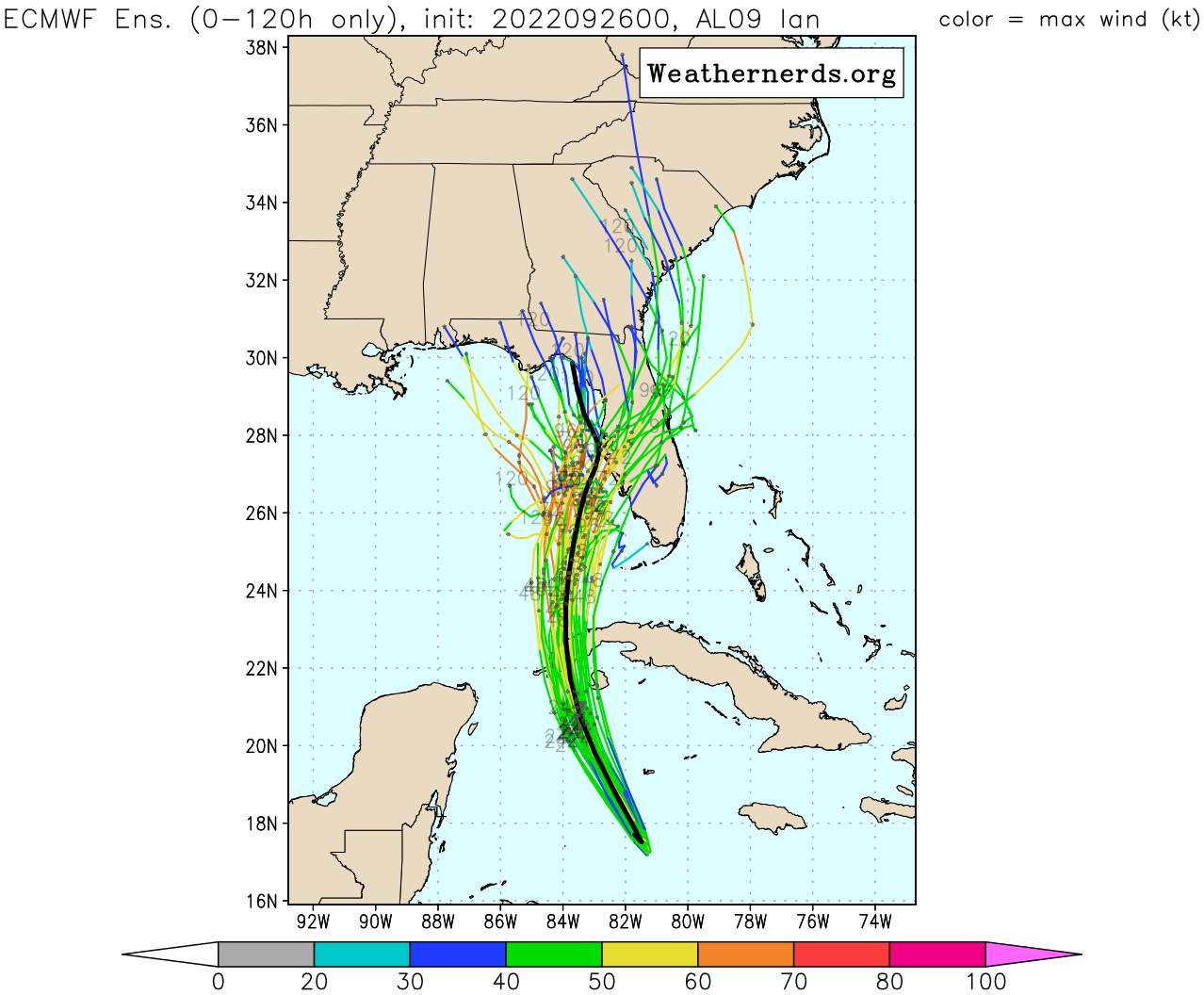

GEFS Ensemble
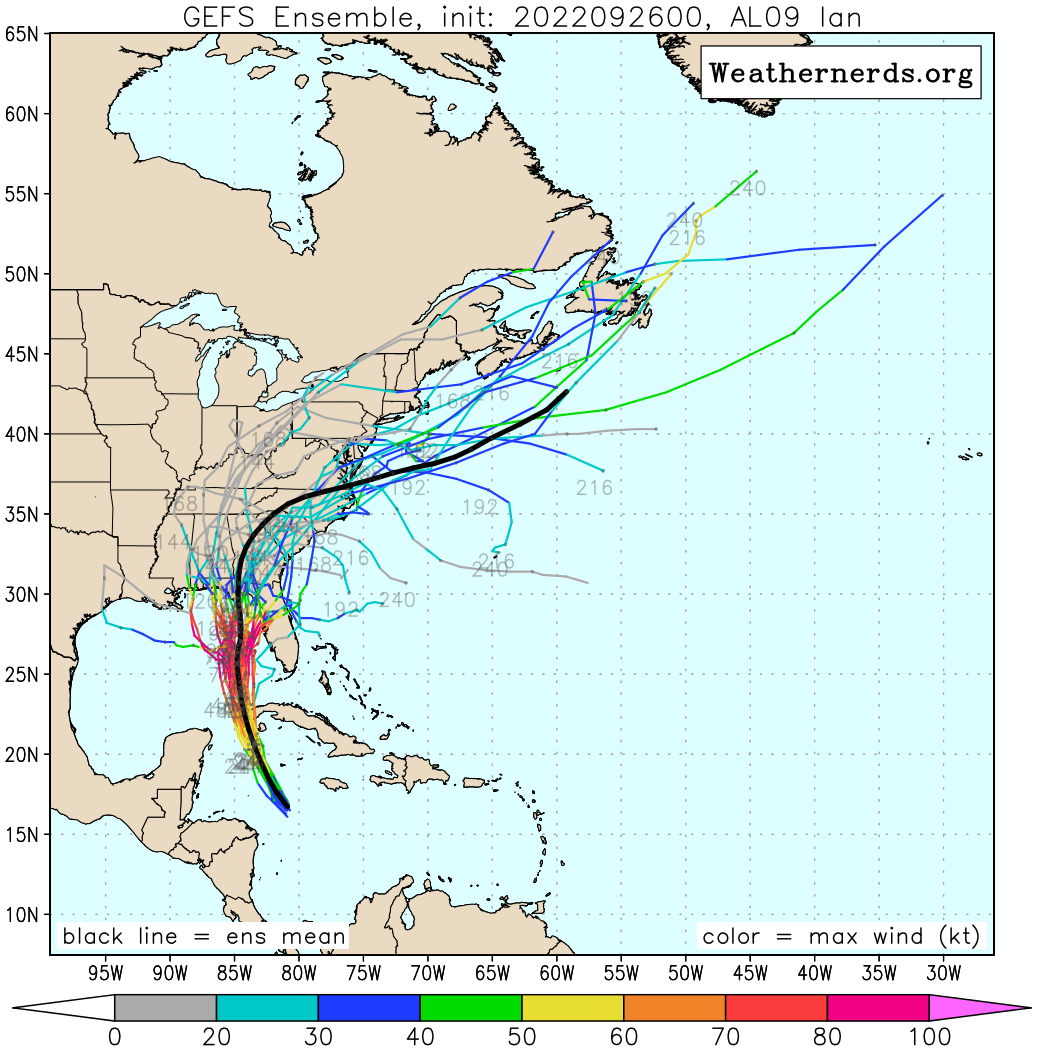

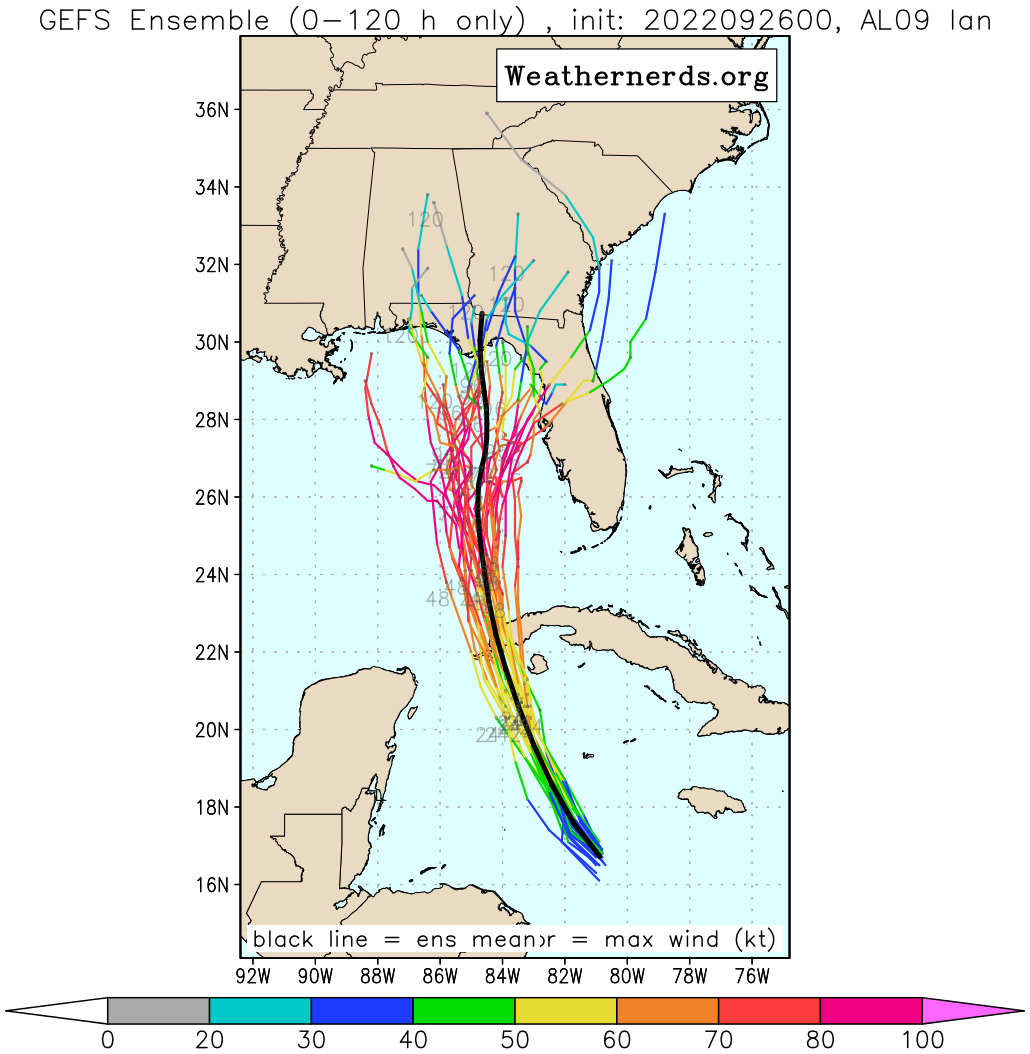

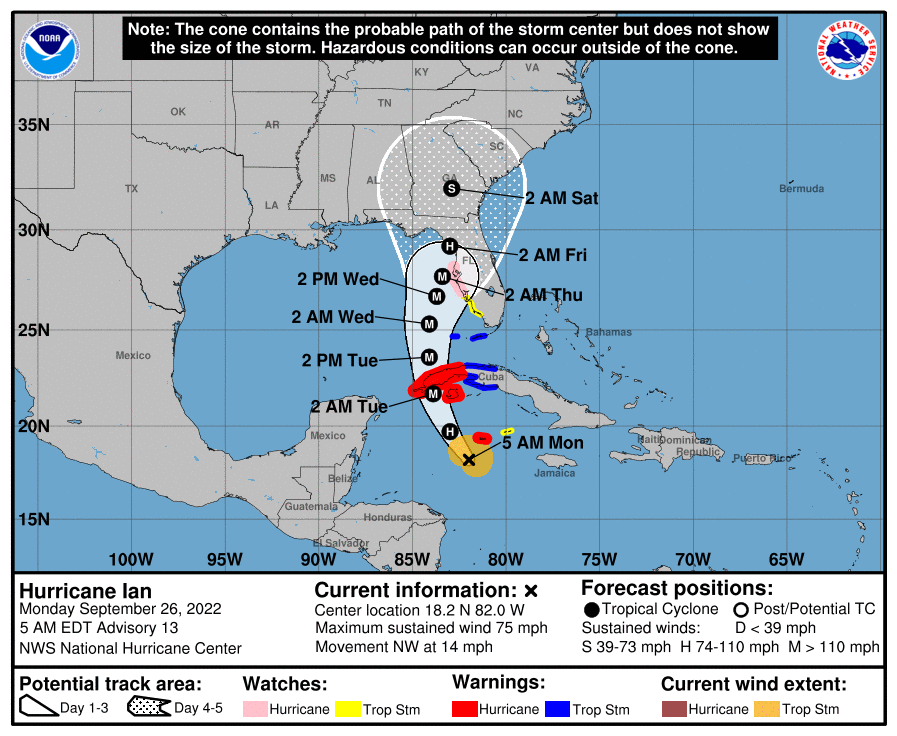

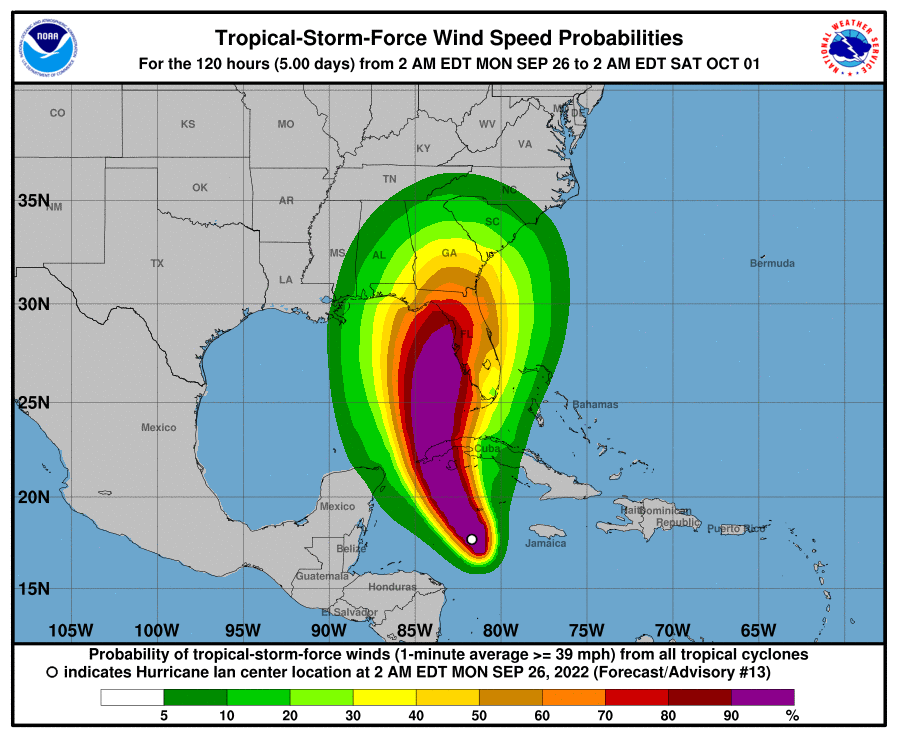

Hurricane Ian Discussion Number 13 NWS National Hurricane Center Miami FL AL092022 500 AM EDT Mon Sep 26 2022 Satellite imagery shows that Ian has quickly become better organized overnight. Banding has increased in all quadrants of the storm, and the eye has become much better defined in radar data from Grand Cayman. The improving eye structure was also reported by an Air Force Reserve reconnaissance aircraft that was in the storm overnight. During a single pass through the northeastern portion of the storm the plane measured peak 700-mb flight-level winds of 71 kt and SFMR winds of 57 kt. Given the continued increase in organization and drop in central pressure on the latest center fix, the initial intensity has been increased to 65 kt, making Ian the fourth hurricane of the 2022 hurricane season. The latest center drop from the aircraft supported a minimum pressure of 983 mb. In addition to the development of an inner core, the upper-level outflow over the storm has expanded overnight. Ian will be traversing the warm waters (30 degrees C) of the northwestern Caribbean and remain within very low shear conditions today. These very conducive environmental factors along with the improved structure of the storm are likely to result in rapid intensification today, and Ian is forecast to be a major hurricane when it moves near or over western Cuba tonight. This is supported by the majority of the intensity guidance, and the SHIPS Rapid Intensification (RI) Index that gives a 90 percent chance of a 30 kt increase in wind speed over the next 24 hours, and about a 60 percent chance of a 40 kt increase in wind speed during that same period. Ian is not expected to spend much time over western Cuba, and additional strengthening is likely over the southeastern Gulf of Mexico on Tuesday. Around 60 hours, a sharp increase in southwesterly vertical wind shear and a drier mid-level environment to the northwest of Ian is likely to induce some weakening. Despite the reduction in intensity, Ian is likely to have an expanding wind field and will be slowing down by that time, which will have the potential to produce significant wind and storm surge impacts along the west coast of Florida. The initial motion estimate is 325/12 kt. Ian is expected to turn northward around the western side of a mid-level ridge during the next day or so. Later in the period, a broad trough over the eastern United States is forecast to induce a north-northeastward motion, however the steering currents are forecast to weaken around day 3, and a slower forward speed is expected by that time. Although the track guidance is in good agreement during the first 48 hours, there is still significant spread after that time. The UKMET and ECWMF are still on the eastern side of the guidance and show a track very near or over the west-central coast of Florida while the GFS, HWRF, and HMON, and GFS ensemble mean are on the western side with a track toward Appalachia Bay. The NHC track forecast remains close to the TVCA multi-model consensus aid, and is very similar to the previous official forecast. It should again be stressed that there is still significant uncertainty in the track of Ian, especially in the 3-5 day time frame, and users should not focus on the details of the track forecast at longer time ranges. Key Messages: 1. Ian is expected to produce heavy rainfall and instances of flash flooding and possible mudslides in areas of higher terrain, particularly over Jamaica and Cuba. Considerable flooding impacts are possible later this week in west central Florida. Additional flash and urban flooding, and flooding on rivers across the Florida Peninsula and parts of the Southeast cannot be ruled out for later this week. 2. Life-threatening storm surge and hurricane-force winds are expected in portions of western Cuba beginning late today, and Ian is forecast to be at major hurricane strength when it is near western Cuba. Efforts to protect life and property should be rushed to completion. 3. Ian is expected to be a major hurricane in the eastern Gulf of Mexico during the middle of this week. Regardless of Ian’s exact track and intensity, there is a risk of a life-threatening storm surge, hurricane-force winds, and heavy rainfall along the west coast of Florida and the Florida Panhandle by the middle of this week. Tropical Storm and Hurricane Watches have been issued for a portion of the west coast of Florida and additional watches may be required later today. FORECAST POSITIONS AND MAX WINDS INIT 26/0900Z 18.2N 82.0W 65 KT 75 MPH 12H 26/1800Z 19.7N 83.0W 90 KT 105 MPH 24H 27/0600Z 21.7N 83.9W 105 KT 120 MPH 36H 27/1800Z 23.6N 84.1W 115 KT 130 MPH 48H 28/0600Z 25.3N 84.1W 120 KT 140 MPH 60H 28/1800Z 26.7N 83.7W 115 KT 130 MPH 72H 29/0600Z 27.7N 83.4W 100 KT 115 MPH 96H 30/0600Z 29.2N 83.0W 80 KT 90 MPH 120H 01/0600Z 32.0N 82.9W 35 KT 40 MPH...INLAND $$ Forecaster Brown/Roberts





